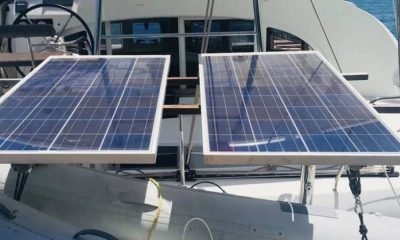Sector News
Global Carbon Budget 2018: Projected rise in global carbon dioxide of 2.7 percent

The WCRP and Future Earth sponsored Global Carbon Project has published its Carbon Budget 2018where it estimates that CO2 emissions will rise by a projected 2.7 percent this year, with an uncertainty range between 1.8 percent and 3.7 percent. In 2017, carbon emissions grew by 1.6 percent after a three-year hiatus. The budget was published today in Earth System Science Data and has clear implications for discussions at the Katowice Climate Change Conference.
Please also see the excellent article produced by Future Earth.
Sector News
We have surpassed the psychological threshold of 10,000 megawatts in solar energy

As of the end of June, Turkey’s total installed capacity reached 104,800 Megawatts (MW), with solar energy accounting for 10,195 MW. Turkey is among the fastest-growing countries in the solar energy sector in Europe, with solar energy holding a 10% share in the country’s installed capacity. The goal is to increase the solar energy capacity to 52,300 MW by the year 2035.
Mehmet Doğan, a board member of the Energy Industrialists and Business People Association (ENSİA) and the General Manager of HSA Energy, highlighted the importance of establishing licensed solar power plants (GES) in areas far from city centers and lands that have completely lost their agricultural characteristics. He emphasized that energy production and food security are not alternatives to each other.
Doğan pointed out that rooftop solar installations in Turkey are currently well below their potential. He said, “As of June, our country has surpassed the psychological threshold of 10,000 MW in solar energy, and we should applaud this significant achievement. However, we must acknowledge that we still have a long way to go. The potential electricity production from rooftop solar installations alone is at the level of 55,000 MW, which is more than five times the capacity of all the solar plants built so far. We have much untapped potential in our rooftops. Our priority should definitely be rooftop solar installations. All obstacles preventing citizens with the means and capacity from becoming energy producers should be removed. Licensed solar power plants, on the other hand, should be built in areas far from residential areas and lands that have completely lost their agricultural characteristics. It is disheartening to see many power plants built in forested areas and lands used for agriculture. Additionally, we must utilize solar energy in specially designed greenhouses to prevent water waste in agricultural production.”
Mehmet Doğan stressed that solar energy has the highest potential among renewable energy sources in Turkey. According to the National Action Plan, the target is to achieve a total installed capacity of 189,700 MW by 2035, with solar energy accounting for 52,900 MW.
He further stated, “In the next 12 years, investments in solar energy will be more than five times greater than what has been done until now. By 2030, 50% of global electricity demand will be met by renewable energy sources, with solar energy making the most significant contribution. The solar energy capacity will increase by approximately 280 GW annually until 2030, with an average annual growth rate of about 12%. Turkey is preparing for this significant shift in energy with increasing investments in wind energy in recent years. Among our members, there are very strong companies making investments in this field. The least efficient solar region in Turkey has a higher potential than the most efficient region in Germany. While we are just starting to surpass 10,000 MW in solar energy, Germany, with its less efficient solar resources, generates 70,000 MW, which is seven times more than us. In solar energy alone, our potential installed capacity is over 200,000 MW. If we fully utilize this potential, we can generate enough energy to power two Turkeys. Our priority in solar investments should always be rooftop solar installations. The more citizens we attract to become energy producers, the more we will reduce our dependency on foreign energy sources and boost our development.”
Sector News
Turbo Energy, to list its Artificial Intelligence-enabled solar battery technology on NASDAQ

Today, Umbrella Solar Investment, S.A., USI, announced that its wholly owned subsidiary, Turbo Energy, S.A. (Turbo Energy) has applied to the SEC to file a Form F-1 prospectus for a securities offering to certain institutional investors in the United States and other countries ahead of the listing of its shares through ADRs on the National Association of Securities Dealers Automated Quotations (NASDAQ) stock market in New York (USA). The SEC’s approval of the prospectus is expected to be granted in the coming weeks and the market will be informed in accordingly.
Turbo Energy, with registered offices in Valencia, designs, manufactures and markets innovative products for residential, commercial and industrial self-consumption solar PV installations featuring advanced technological solutions.By listing its shares on the main international stock market for tech firms, Turbo Energy’s goal is to implement a growth strategy based on accelerating its product roadmap and extending the features of its Artificial Intelligence algorithmic platform.Turbo Energy is committed to combating climate change by creating value-added solar products with technologies that bring together three areas of major stock market investment: solar energy, lithium-ion battery power storage and AI systems.
In the words of Enrique Selva, CEO of Turbo Energy: “Through Turbo Energy’s NASDAQ listing, we intend to drive the company’s strategic growth to capitalise on the growing market for artificial intelligence applied to renewable energy. We are backed by a 10-year track record of innovation, enabling us to deploy our flagship product SunBox, an all-in- one solar system with strong uptake in the residential, commercial and industrial markets”.
Based on the preliminary non-binding range included in the F-1 prospectus, the offering is envisaged to have a minimum pre-money valuation of USD 125 million and will be open to all types of institutional investors. The formula adopted is through trading of ADRs representing Turbo Energy shares with the support of CITIBANK as custodian bank. A minimum of USD 5 million is expected to be raised.
About Umbrella Solar Investment:
Umbrella Solar Investment leverages the full business potentials of the solar PV value chain, generating renewable electricity through the company IM2 Energía Solar, deploying electric vehicle charging points through IM2 e-mobility and developing cutting-edge equipment for residential solar self-consumption through Turbo Energy.
Umbrella provides answers to the huge challenges posed to society by the serious issues of climate crisis, energy poverty and the transition to a sustainable energy model.
LEGAL NOTICE: A registration statement relating to these Turbo Energy securities has been filed with the Securities and Exchange Commission but has not yet become effective. These securities may not be sold nor may offers to buy be accepted prior to the time the registration statement becomes effective.
This press release shall not constitute an offer to sell or the solicitation of an offer to buy these Turbo Energy securities, nor shall there be any sale of these securities in any state or jurisdiction in which such offer, solicitation or sale would be unlawful prior to registration or qualification under the securities laws of any such state or jurisdiction.
Sector News
Hitachi ABB Power Grids tracks Dublin’s data center surge via grid connections

One gigawatt substation will support the city’s growing number of data centers to enable the new norm of remote working through efficient connections to electrical infrastructure
Hitachi ABB Power Grids has delivered a fully integrated, high-voltage substation close to Dublin’s digital business hub at Castlebagot, fast-tracking the standard two and a half year execution time to just 18 months, to keep the city’s growing number of large, increasingly important data centers running smoothly 24/7.
The project was commissioned by Ireland’s state-owned Electricity Supply Board (ESB) to meet Dublin’s recent, unprecedented upsurge in demand for electricity, due to the proliferation of new data centers. The project is the largest privately contracted substation development in Ireland to date. To ensure reliable supply to this booming industry, Hitachi ABB Power Grids has delivered a 220 kilovolt (kV)/110 kV substation with gas-insulated switchgear, including the protection and control SCADA system enabling an advanced power system management and monitoring of equipment status while in service. The gas insulated switchgear is a compact technology designed to minimize the substation’s foot-print, enabling space saving of up to 70 percent compared to air-insulated switchgear.
Dublin hosts some of the most important high-tech firms in Europe, in addition to a wide range of thriving tech start-up and colocation services. Planners are currently processing applications for additional, major data centers that will more than double the city’s electricity consumption in the years ahead. With its state-of-the art efficient grid solutions, Hitachi ABB Power Grids is helping to optimize power consumption while maintaining quality of supply.
“We specialize in the prompt delivery of reliable, high-voltage grid connections that respond to the ever growing use of advanced solutions continuing to support people through the challenging times of the current global pandemic.Efficient connections to electrical infrastructure are more critical than ever,” says Niklas Persson, Managing Director of Grid Integration business unit at Hitachi ABB Power Grids. “We are proud to enable the transition to the new norm of connecting people, when disruption to working patterns has increased the demand for remote and digital services, by meeting the need for a stable power supply.”
The energization of the Castlebagot substation in such a short time is even more remarkable given the current demanding situation. Hitachi ABB Power Grids and ESB were able to overcome this challenge due to their digital capabilities which made it possible to energize the substation safely and sustainably, while ensuring business continuity.
Substations are the building blocks for any power grid and facilitate the effective integration of power from conventional and renewable generation sources, to efficiently transmit and distribute it to consumption centers.
Hitachi ABB Power Grids is fast becoming the leading supplier of grid and power quality solutions for data center grid connections for both utilities and data center owners worldwide and is helping cities around the world to meet the extensive power demands of large data center projects. For this project, early collaboration with ESB ensured a design that fulfilled the utility’s availability and reliability requirements. It enabled fast project execution, leveraging our vast knowledge of utility grid codes and connection practices in different countries.
-

 Solar Panels6 years ago
Solar Panels6 years agoAre Tesla solar roof tiles worth it?
-

 Genel6 years ago
Genel6 years agoMaldives luxury resort is powered entirely by solar panels
-

 Control Systems Et Software7 years ago
Control Systems Et Software7 years agoHOMER responds to the rapidly growing solar+storage market with Grid software
-

 Solar Technologies5 years ago
Solar Technologies5 years agoGOODWE PARTNERSHIP WITH GE
-

 Solar Technologies5 years ago
Solar Technologies5 years agoSolar panel covered Autobahn can break speed record for Germany’s energy transition
-

 Operation and Maintenance7 years ago
Operation and Maintenance7 years ago1000-Acre Sunflower Solar Farm to be Built for Entergy Mississippi
-

 Events5 years ago
Events5 years agoGREENoneTEC revolutionizes solar heating with Sunpad
-

 Large -Scale Solar Panels7 years ago
Large -Scale Solar Panels7 years agoABB to construct solar power expansion in Dubai








